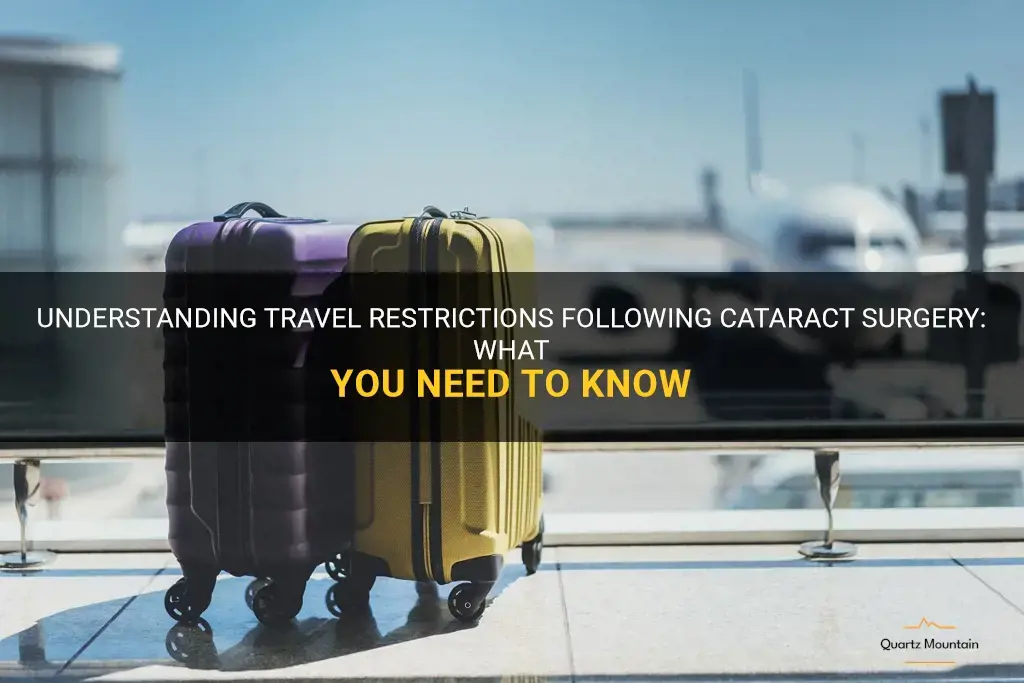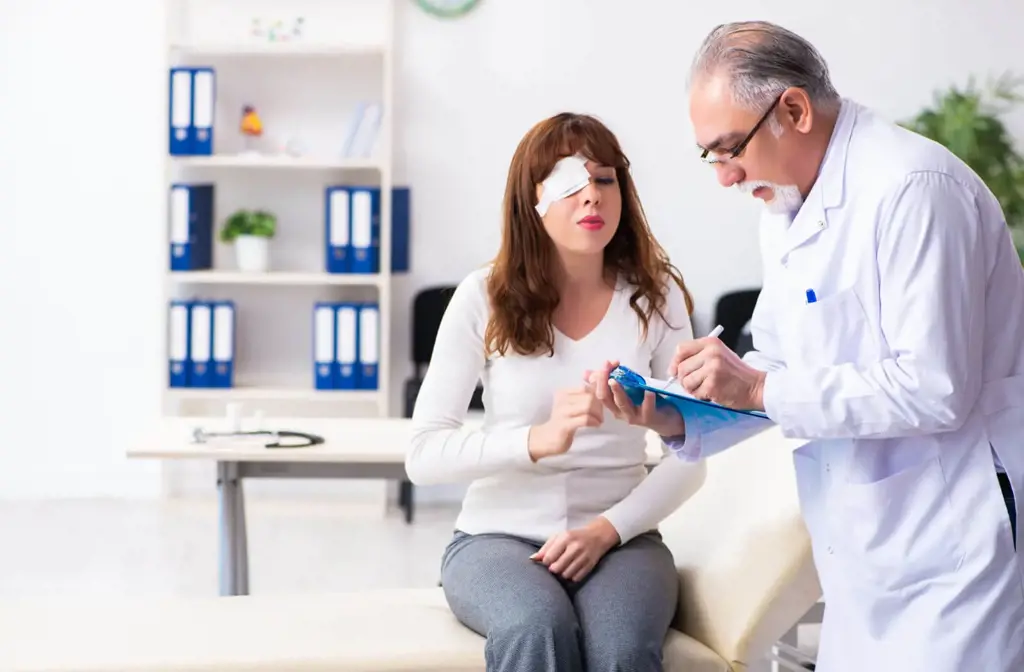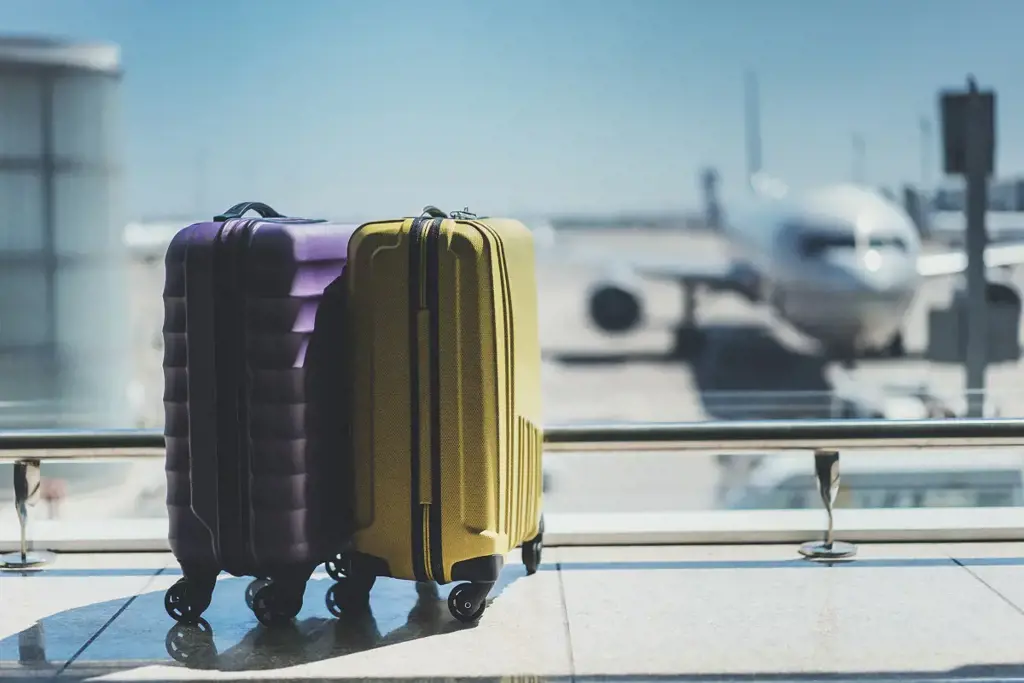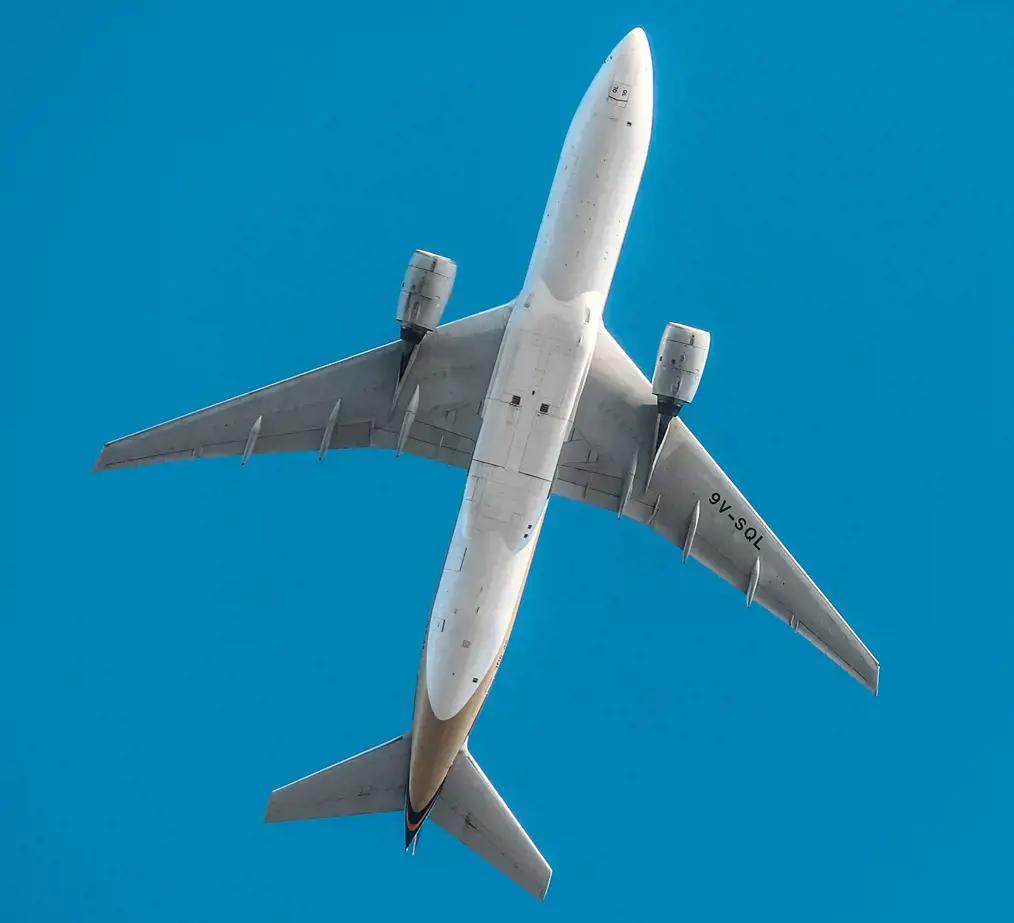
Imagine you've just undergone cataract surgery and are eager to start exploring the world with your new, improved vision. However, before you start planning your next adventure, it's important to be aware of the travel restrictions and precautions you should take after this procedure. Cataract surgery is a common and relatively straightforward procedure, but it does require some post-operative care and recovery time. By understanding and following these recommendations, you can ensure a smooth and worry-free journey as you continue to embrace the wonders of the world with your revitalized eyesight.
What You'll Learn
- How soon can I travel after cataract surgery?
- Are there any specific travel restrictions I should be aware of after cataract surgery?
- Are there any activities or actions I should avoid while traveling after cataract surgery?
- Is it safe to fly after cataract surgery?
- What precautions should I take while traveling to ensure the best recovery after cataract surgery?

How soon can I travel after cataract surgery?

Cataract surgery is a common procedure performed to remove a clouded lens in the eye and replace it with an artificial one. After undergoing this surgery, many patients are eager to resume their normal lives and travel without restrictions. However, it is important to understand the recovery process and any precautions that need to be taken.
Generally, most patients can travel within a few days to a week after cataract surgery. However, the exact timing may vary depending on the individual and their surgeon's recommendations.
During the immediate postoperative period, it is crucial to follow your surgeon's instructions for proper healing. This may include using prescribed eye drops, wearing protective eyewear, and avoiding activities that could put strain on the eyes. Traveling too soon after surgery may increase the risk of complications and hinder the healing process.
It is also important to consider the mode of travel when planning your trip after cataract surgery. Air travel, for example, can increase the risk of dryness and irritation in the eyes due to the low humidity in the cabin. If you must fly, using lubricating eye drops frequently and wearing sunglasses can help alleviate these symptoms.
When traveling by car, it is essential to take frequent breaks to rest your eyes and avoid prolonged exposure to air conditioning or heating, which can dry out the eyes. Additionally, wearing sunglasses can provide protection against bright sunlight and glare.
If you have plans to travel internationally after cataract surgery, it is recommended to consult with your surgeon beforehand. They may advise you on any precautions or additional medication that may be necessary in unfamiliar environments.
It is worth noting that every individual's recovery may vary. While some patients may feel comfortable and ready to travel within a few days after surgery, others may require a slightly longer recovery period. It is important to listen to your body and consult with your surgeon if you have any concerns or doubts.
In conclusion, it is typically safe to travel within a few days to a week after cataract surgery, but it is essential to follow your surgeon's instructions and take necessary precautions during your journey. By doing so, you can ensure a smooth recovery and enjoy your travels without compromising your eye health.

Are there any specific travel restrictions I should be aware of after cataract surgery?

After undergoing cataract surgery, it is important to take certain precautions and adhere to specific travel restrictions to ensure a smooth recovery process. Cataract surgery involves the removal of the cloudy lens in the eye and its replacement with an artificial lens, which can temporarily affect vision and increase the risk of complications. Here are some travel restrictions you should be aware of after cataract surgery:
- Avoid flying for a few days: Air travel can increase the risk of infection and dry out the eyes, which is not ideal after cataract surgery. It is generally recommended to wait at least two to three days before flying to allow your eyes to heal and reduce the risk of complications.
- Don't drive immediately after surgery: It is important to avoid driving immediately after cataract surgery as the effects of anesthesia and the eye drops used during the procedure can cause blurry vision and affect your ability to react quickly. It is generally recommended to have someone accompany you or arrange for transportation after the surgery.
- Protect your eyes from dust and debris: During the early stages of recovery, your eyes may be more sensitive to dust, pollen, and other environmental irritants. It is important to wear sunglasses and avoid dusty or windy environments to prevent any complications and promote healing.
- Avoid swimming and hot tubs: Water can introduce bacteria into the eyes, increasing the risk of infection. It is best to avoid swimming pools, hot tubs, and other bodies of water for at least a week after cataract surgery to allow your eyes to fully heal and reduce the risk of complications.
- Limit screen time: Staring at screens for extended periods can strain your eyes and cause dryness, which can be particularly uncomfortable after cataract surgery. It is advisable to limit your screen time and take frequent breaks to rest your eyes and prevent any unnecessary discomfort or complications.
- Follow your surgeon's post-operative instructions: Each individual's recovery process may vary, and your surgeon will provide you with specific instructions tailored to your needs. It is important to follow these instructions carefully, including any restrictions on activities, as they are designed to promote healing and reduce the risk of complications.
It is crucial to remember that everyone's recovery process is unique, and it is essential to consult with your surgeon to obtain specific guidelines and travel restrictions based on your individual circumstances. By adhering to these restrictions and taking proper care of your eyes, you can ensure a successful recovery and enjoy the best possible outcome after cataract surgery.
Exploring the Implications of Travel Restrictions for Las Vegas
You may want to see also

Are there any activities or actions I should avoid while traveling after cataract surgery?

Cataract surgery is a common and relatively safe procedure that involves the removal of the natural lens of the eye and the implantation of an artificial lens. After surgery, it is important to take certain precautions to ensure a successful recovery and to avoid complications. When it comes to traveling after cataract surgery, there are a few activities and actions that you should avoid to ensure the best possible outcome.
- Avoid prolonged exposure to sunlight and bright lights: After cataract surgery, your eyes may be more sensitive to light. It is important to wear sunglasses that provide UV protection whenever you are outside, especially during the peak hours of sunlight. Bright lights, such as those found in airports or on airplanes, can also cause discomfort and should be avoided if possible. If you are traveling during the day, try to sit in a shaded area or wear a hat to protect your eyes.
- Avoid rubbing or touching your eyes: It is normal to experience some itching or irritation after cataract surgery, but it is important to avoid rubbing or touching your eyes. This can increase the risk of infection or injury to the surgical site. If you need to clean your eyes, use a clean tissue or a soft cloth and gently pat the area around your eyes.
- Avoid strenuous activities: After cataract surgery, it is important to avoid any activities that could strain or put pressure on your eyes. This includes heavy lifting, bending over, or any activity that could increase the pressure inside your eye. It is also important to avoid activities that could lead to eye injuries, such as contact sports or recreational activities that involve flying objects.
- Avoid swimming or getting water in your eyes: Water can introduce bacteria into the eyes, increasing the risk of infection after surgery. It is important to avoid swimming, hot tubs, saunas, or any activity that could lead to water entering your eyes. If you do accidentally get water in your eyes, rinse them with clean water immediately and consult your doctor.
- Avoid excessive reading or screen time: Staring at a screen or reading for long periods of time can strain your eyes and slow down the healing process after surgery. It is important to take breaks and rest your eyes frequently, especially when traveling. Use this time to relax and enjoy the scenery or listen to an audiobook instead.
- Follow your doctor's instructions: Every person's recovery from cataract surgery is unique, so it is important to follow your doctor's specific instructions regarding travel and activities. They may recommend certain eye drops or medications to use during your trip, or provide guidelines on when it is safe to resume normal activities. It is important to communicate any concerns or questions you have with your doctor before or during your trip.
In conclusion, while it is possible to travel after cataract surgery, it is important to take certain precautions to ensure a successful recovery. Avoiding prolonged exposure to sunlight and bright lights, not rubbing or touching your eyes, avoiding strenuous activities, swimming or getting water in your eyes, limiting screen time, and following your doctor's instructions are all important steps to take when traveling after cataract surgery. By following these guidelines, you can minimize the risk of complications and enjoy a safe and enjoyable trip.
Germany Implements Travel Restrictions for Visitors to Mallorca
You may want to see also

Is it safe to fly after cataract surgery?

Cataract surgery is a common procedure performed to remove a cloudy lens from the eye and replace it with an artificial lens. It is generally considered a safe and effective surgery, with most patients experiencing improved vision following the procedure. However, many patients may wonder if it is safe to fly after undergoing cataract surgery.
The safety of flying after cataract surgery primarily depends on the individual patient and their specific circumstances. In general, most patients are cleared for air travel within a few days or weeks after the surgery. However, it is important to consult with your eye surgeon for specific guidelines and recommendations based on your unique case.
One of the main considerations when determining if it is safe to fly after cataract surgery is the healing process. After cataract surgery, the eye needs time to heal and adjust to the artificial lens. The first few days following the surgery are critical, as the eye is more vulnerable to potential complications. It is essential to follow your surgeon's post-operative instructions, which may include using prescribed eye drops and wearing a protective shield or glasses. It is crucial not to expose your eyes to any potential sources of infection or irritation during this healing period.
Another factor to consider is the altitude and cabin pressure changes experienced during air travel. The changes in pressure can affect the eye, especially if there are any complications or issues with the healing process. It is important to discuss your travel plans with your surgeon, who can provide guidance on when it is safe to fly based on your specific circumstances.
The duration of the flight is also a relevant factor to consider. Longer flights may increase the risk of exposure to potential sources of infection or irritation. It is crucial to keep your eyes well lubricated during the flight by using lubricating eye drops, especially if you have dry eye syndrome. Additionally, it is advisable to avoid rubbing your eyes or touching them unnecessarily during the flight to reduce the risk of infection.
Here are some general steps to ensure a safe flight after cataract surgery:
- Consult with your eye surgeon: Discuss your travel plans and concerns with your eye surgeon, who can provide personalized recommendations based on your specific case.
- Follow post-operative instructions: Strictly adhere to your surgeon's post-operative instructions, including using prescribed eye drops and wearing protective shields or glasses.
- Wait for the appropriate healing time: Allow sufficient time for your eyes to heal and adjust to the artificial lens before considering air travel. Most patients are cleared for flying within a few days or weeks, but this can vary depending on individual factors.
- Be mindful of cabin pressure changes: Consider the potential impact of altitude and cabin pressure changes on your eyes. Seek guidance from your surgeon on when it is safe to fly based on your specific circumstances.
- Keep your eyes well lubricated: Use lubricating eye drops during the flight to prevent dryness and discomfort, especially if you have dry eye syndrome.
- Avoid touching or rubbing your eyes: Reduce the risk of infection by refraining from touching or rubbing your eyes during the flight.
It is essential to note that this article provides general information and should not replace professional medical advice. Each patient's case is unique, and it is vital to consult with your eye surgeon for specific guidelines and recommendations before making any travel plans after cataract surgery.
To conclude, while it generally is safe to fly after cataract surgery, it is important to consider individual factors, follow post-operative instructions, and seek guidance from your eye surgeon. By taking proper precautions and consulting with your surgeon, you can help ensure a safe and comfortable flight following cataract surgery.
Understanding California's Assault Weapon Travel and Storage Restrictions
You may want to see also

What precautions should I take while traveling to ensure the best recovery after cataract surgery?

Cataract surgery is a common and highly effective procedure that can restore clear vision in individuals with cataracts. While the surgery itself is relatively quick and straightforward, it is important to take certain precautions while traveling after the procedure to ensure the best possible recovery.
- Follow your surgeon's post-operative instructions: Your surgeon will provide you with specific guidelines to follow after your cataract surgery. It is essential to follow these instructions carefully, as they are tailored to your individual needs and will promote healing. This may include using prescribed eye drops, wearing an eye shield at night, and avoiding certain activities that could put strain on your eyes.
- Avoid strenuous activities: While traveling, it is important to avoid any strenuous activities that could strain your eyes. This includes heavy lifting, bending, and activities that involve rapid head movements. Strenuous activities can increase pressure in the eyes and potentially lead to complications.
- Protect your eyes from sunlight: After cataract surgery, it is common for your eyes to be sensitive to sunlight. This sensitivity can be exacerbated by traveling, which often involves spending time outdoors. Wear sunglasses with 100% UV protection to protect your eyes from harmful rays. Additionally, consider wearing a wide-brimmed hat or using an umbrella to further shield your eyes from sunlight.
- Avoid dusty and smoky environments: Dust and smoke particles can irritate your eyes and potentially lead to complications after cataract surgery. While traveling, try to avoid dusty or smoky environments as much as possible. If you must be in such an environment, consider wearing protective eyewear or a mask to minimize exposure.
- Keep your eyes moisturized: Air travel can often lead to dry eyes, which can be particularly uncomfortable after cataract surgery. Keep your eyes moisturized by using lubricating eye drops frequently, especially during long flights or car rides. This will help prevent dryness and irritation.
- Minimize exposure to germs: While traveling, it is important to minimize your exposure to germs, as infections can significantly delay the healing process after cataract surgery. Wash your hands frequently, especially before touching your eyes or applying eye drops. Avoid touching your eyes with unclean hands, and try to keep your personal belongings, such as pillows or towels, clean and germ-free.
- Take breaks during long journeys: If you are traveling for an extended period, such as a long flight or car ride, it is important to take breaks and give your eyes some rest. Blinking and focusing on objects at a distance will help keep your eyes lubricated and reduce strain. Additionally, consider using a sleep mask or closing your eyes for short periods to allow them to rest and rejuvenate.
In conclusion, traveling after cataract surgery requires some precautions to ensure the best possible recovery. By following your surgeon's instructions, avoiding strenuous activities, protecting your eyes from sunlight and irritants, keeping your eyes moisturized, minimizing exposure to germs, and taking breaks during long journeys, you can promote healing and enjoy a smooth recovery process. Remember to consult your surgeon before traveling to ensure it is safe and appropriate for your individual situation.
Armenia to Dubai: Latest Updates on Travel Restrictions and Guidelines
You may want to see also
Frequently asked questions
It is generally recommended to wait at least 24-48 hours before traveling after cataract surgery. This allows your eye to heal and reduces the risk of complications during your travel. Your eye doctor will provide specific instructions based on your individual recovery and travel plans.
During air travel after cataract surgery, it is important to avoid rubbing or touching your eyes, as this can increase the risk of infection or injury. It is also recommended to wear sunglasses or protective eyewear to shield your eyes from bright lights and potential debris. Additionally, be mindful of the dry air in the cabin and use artificial tears as needed to keep your eyes lubricated.
If you are planning international travel after cataract surgery, it is important to consult with your eye doctor and consider any specific travel restrictions or requirements related to your destination. Some countries may have specific regulations or guidelines for individuals who have recently undergone eye surgery. It may be necessary to provide documentation or obtain clearance from your eye doctor before traveling internationally.







